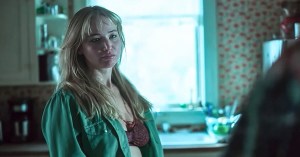The Morning Show Is About to Get Way More Personal for Its Leads, Showrunner Says
"Everyone on the show is really screwed up in different ways," Kerry Ehrin tells Rotten Tomatoes about characters in her new Apple TV+ series starring Jennifer Aniston, Reese Witherspoon, and Steve Carell.

(Photo by )
The Morning Show season 1 had “real estate issues” executive producer Kerry Ehrin told Rotten Tomatoes about building out the world of the Apple TV+ workplace drama.
Trying to fit in storylines for such a deep bench of talented cast members — Jennifer Aniston, Reese Witherspoon, Steve Carell, Mark Duplass, Billy Crudup, Gugu Mbatha-Raw, Nestor Carbonell, Desean Terry, Bel Powley, Karen Pittman, Janina Gavankar, and on — was frustrating for the first season, Ehrin admitted.
Understandably, but the Bates Motel co-creator and Emmy nominee for The Wonder Years and Friday Night Lights more than rose to the challenge, creating an event series with enough watercooler moments to have a measurable impact on national worker productivity.
We kid, but The Morning Show‘s hot topics are no joke. Tackling timely subjects like integrity in journalism, women supporting women in the workplace, the meaning of consent, and managing a legitimate workplace romance, the series boldly dives into the #MeToo debate. For one, the series explores the perspective of a workplace sexual predator, which not everyone is happy about, but others have called out as the core drama of the series.
As the rest of the season continues to unfold with new episodes every Friday (and as Ehrin and the writers room continue to bang out season 2, which they’ve been working on for a few months), she shares how she became involved with The Morning Show and what we can expect for the rest of the premiere season.
Kimberly Potts for Rotten Tomatoes: What attracted you to this topic, to this project?
Kerry Ehrin: Initially it was Brian Stelter’s book, Top of the Morning (which the Apple TV+ series is based on). I really liked it, and the tone of the world he was describing, and I was just saying it felt like a very good stage to write great character stories on, set against this high stakes world, but also there’s a social absurdity to that world … so competitive, and the behavior gets a little bit like, almost high school-ish. So that was a very intriguing world to me. And then obviously Reese and Jennifer, getting to create complex female characters with high profile, high stakes jobs, and write about female relationships in a real way was very intriguing to me. All those elements don’t line up every day.

(Photo by Apple TV+)
One of the most things with the stars of morning TV is how much their personal lives are impacted by their jobs. Even just the fact that they have to get up at these ridiculous hours — that has to impact their time with their kids and their family and friends and personal time. How much are you going to get into that, Alex and Bradley’s personal lives, as the season goes on?
Ehrin: A great deal. I think that’s a big part of Alex’s story, how much she has sacrificed to get to that top level. And Bradley is really just entering into this world. So her story is more about being from the outside and trying to acclimate and immerse into it … When you live those kind of hours, there’s no question that it becomes your life and it dictates your life. Any high-stress job becomes your life and dictates your life.
I’m guessing that’s something you can relate to as a showrunner.
Ehrin: Oh, 100 percent. I mean, I could also relate to it when I was working retail. Jobs do end up dictating your life. But yeah, I mean, when you have a ton of financial responsibility for other people, you do live with it all the time.
Getting into the characters, viewers are going to assume that Mitch Kessler (Steve Carell) is Matt Lauer. What is your response to that?
Ehrin: Well, I mean, it isn’t. I get, I guess, why people would go there. I don’t know … I don’t know why they never pick Charlie Rose. But all I can tell you is … it isn’t Matt Lauer. It’s an amalgam of human beings that I’ve interacted with, that have been in my life, and some people that have been in the public eye. But it really is an original tale. It isn’t “The Matt Lauer Story” at all. Nor did I want to write that.

(Photo by Apple TV+)
In the first three episodes, viewers get some viewpoints that they might not be expecting. This is a discussion of all angles and some nuanced points of view that haven’t played out so much in a scripted series. Episode three in particular, with Mitch’s conversation with the director played by Martin Short — do you think people are ready for, or maybe even craving at this point, a nuanced look at this subject?
Ehrin: I feel like there’s a lot of layers to that question. I mean, one of them is, there’s a specific road we’re going down with the stories that we’re telling, and you’re meeting a character in the beginning, so there’s that aspect of it. I’m trying to say this without giving too much stuff away. It’s a story about human beings who are in this web. And I don’t think (Mitch) is written overly sympathetically. It’s interesting to me that people are saying, “Oh, he’s so sympathetic.” And I don’t think he’s any more sympathetic than anyone in the show. I think everyone on the show is really screwed up in different ways. He’s a narcissist, he clearly lives inside his own reality of what’s real and what’s right. And I mean, yeah, Steve Carell is a likable, charming guy, but so are a lot of these guys. So I think you have to look at the whole enchilada. And I would say this will be a better discussion after episode ten.
It’s interesting to see this particular story play out from all these different points of view.
Ehrin: It’s a huge thing. There’s a huge movement. It has affected everybody, and it’s seismic. So yeah, it’s a story of looking at it and at all the elements.

(Photo by Apple TV+)
Kudos for keeping the Martin Short cameo under wraps. He was great, and having such a beloved actor playing that character, saying those shocking things about his behavior, and challenging Mitch to consider his own behavior, was impactful. I hope the surprise of his appearance isn’t spoiled for people before they watch the episode.
Ehrin: That would actually be great, because it is so exciting to see him, and he’s so good. Man, that guy is a great actor. He’s really, really good.
What’s your goal overall with the development of Bradley and Alex’s characters?
Ehrin: They both have important individual stories. Alex’s being about a highly successful person who has sacrificed so much of her life and was so close to this partner who gets fired for sexual misconduct. And it really is about how it dismantles her life. And then Bradley’s is about a person who has a lot of demons from her family and isn’t really psychologically or emotionally set up for success, and finds herself pulled into this world. And how do you, as sort of an emotional outsider of success, how do you function in that world? And can you survive it? Can you thrive in it or is that impossible?
In addition to that, there is the story of these two women who come into each other’s lives, and I really wanted to do a realistic story and not make them hate each other, like All About Eve, or they’re best friends and they’re never mean. I really wanted to do just a real nuanced portrayal of all (aspects) of a female working relationship — all of its wonderful complexities. And that’s been the ongoing road. That’s the heart of it to me, what that relationship is about and how it develops and evolves.

(Photo by Apple TV+)
We’ve met Bradley’s family, her mom and her brother, and there have been hints that she has sort of been almost a parental figure for both of them. Is that something we’ll get into a lot more?
Ehrin: Yeah. That’s a big part of Bradley’s character, who she is and dealing with that. If you have baggage that you haven’t dealt with and you get thrust into a high-stress, high-profile job, it’s a different experience than someone who does not have that baggage.
You’ve made great television, told great stories, on network and cable, and now a streaming service. Has it been different in any big ways creating this show for a streaming service?
Ehrin: There’s been more freedom, certainly. I think that was always a challenge for me, because I’ve been doing this for a while, and for a big chunk of my career there weren’t all these venues available. And you had to fit in (on) broadcast, and it was always, always, always a challenge to — if you’re a little idiosyncratic, if you’re a little dark, if you’re a little to the left of center, it was just harder to fit into that mold, that box, and still get to play with your whole deck of cards.
Do you feel like you finally have gotten to do a show, this show, exactly how you would want to do it?
Ehrin: Yeah, I do. I mean, I felt that way about Bates as well, except for the swearing. It really would have made it a little more (realistic) to have people be able to talk the way people actually speak. And also, commercials are just death to me. That used to kill me about Bates, because I felt like it was like an opera, and then you’d be so into these huge, crazy things, and then it’s an ad for erectile dysfunction or insurance. And it just was like, it completely wrecked it for me. So that was always hard. But this is pretty cool. It is a lot more freedom. It’s a lot more money to make stuff. It’s been pretty great.
New episodes of The Morning Show premiere on Fridays on Apple TV+.







